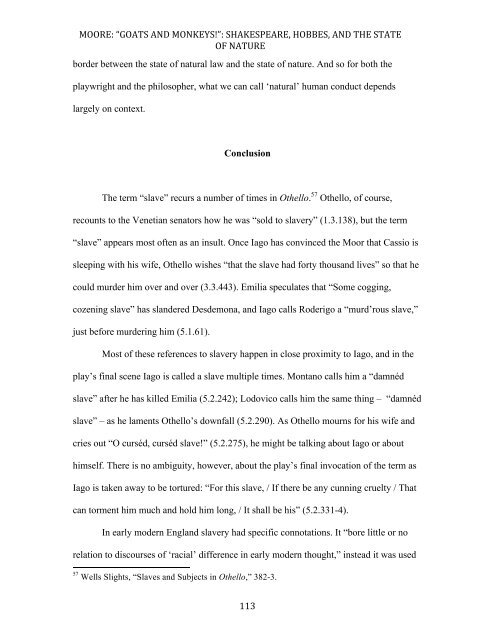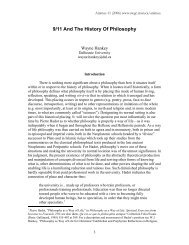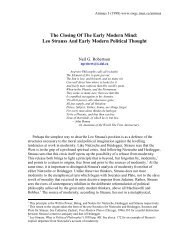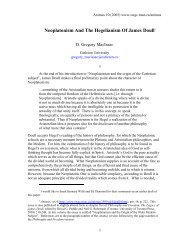âgoats and monkeys!â: shakespeare, hobbes, and the state of nature
âgoats and monkeys!â: shakespeare, hobbes, and the state of nature
âgoats and monkeys!â: shakespeare, hobbes, and the state of nature
Create successful ePaper yourself
Turn your PDF publications into a flip-book with our unique Google optimized e-Paper software.
MOORE: “GOATS AND MONKEYS!”: SHAKESPEARE, HOBBES, AND THE STATE <br />
OF NATURE <br />
border between <strong>the</strong> <strong>state</strong> <strong>of</strong> natural law <strong>and</strong> <strong>the</strong> <strong>state</strong> <strong>of</strong> <strong>nature</strong>. And so for both <strong>the</strong><br />
playwright <strong>and</strong> <strong>the</strong> philosopher, what we can call ‘natural’ human conduct depends<br />
largely on context.<br />
Conclusion<br />
The term “slave” recurs a number <strong>of</strong> times in O<strong>the</strong>llo. 57 O<strong>the</strong>llo, <strong>of</strong> course,<br />
recounts to <strong>the</strong> Venetian senators how he was “sold to slavery” (1.3.138), but <strong>the</strong> term<br />
“slave” appears most <strong>of</strong>ten as an insult. Once Iago has convinced <strong>the</strong> Moor that Cassio is<br />
sleeping with his wife, O<strong>the</strong>llo wishes “that <strong>the</strong> slave had forty thous<strong>and</strong> lives” so that he<br />
could murder him over <strong>and</strong> over (3.3.443). Emilia speculates that “Some cogging,<br />
cozening slave” has sl<strong>and</strong>ered Desdemona, <strong>and</strong> Iago calls Roderigo a “murd’rous slave,”<br />
just before murdering him (5.1.61).<br />
Most <strong>of</strong> <strong>the</strong>se references to slavery happen in close proximity to Iago, <strong>and</strong> in <strong>the</strong><br />
play’s final scene Iago is called a slave multiple times. Montano calls him a “damnéd<br />
slave” after he has killed Emilia (5.2.242); Lodovico calls him <strong>the</strong> same thing – “damnéd<br />
slave” – as he laments O<strong>the</strong>llo’s downfall (5.2.290). As O<strong>the</strong>llo mourns for his wife <strong>and</strong><br />
cries out “O curséd, curséd slave!” (5.2.275), he might be talking about Iago or about<br />
himself. There is no ambiguity, however, about <strong>the</strong> play’s final invocation <strong>of</strong> <strong>the</strong> term as<br />
Iago is taken away to be tortured: “For this slave, / If <strong>the</strong>re be any cunning cruelty / That<br />
can torment him much <strong>and</strong> hold him long, / It shall be his” (5.2.331-4).<br />
In early modern Engl<strong>and</strong> slavery had specific connotations. It “bore little or no<br />
relation to discourses <strong>of</strong> ‘racial’ difference in early modern thought,” instead it was used<br />
57 Wells Slights, “Slaves <strong>and</strong> Subjects in O<strong>the</strong>llo,” 382-3.<br />
113
















